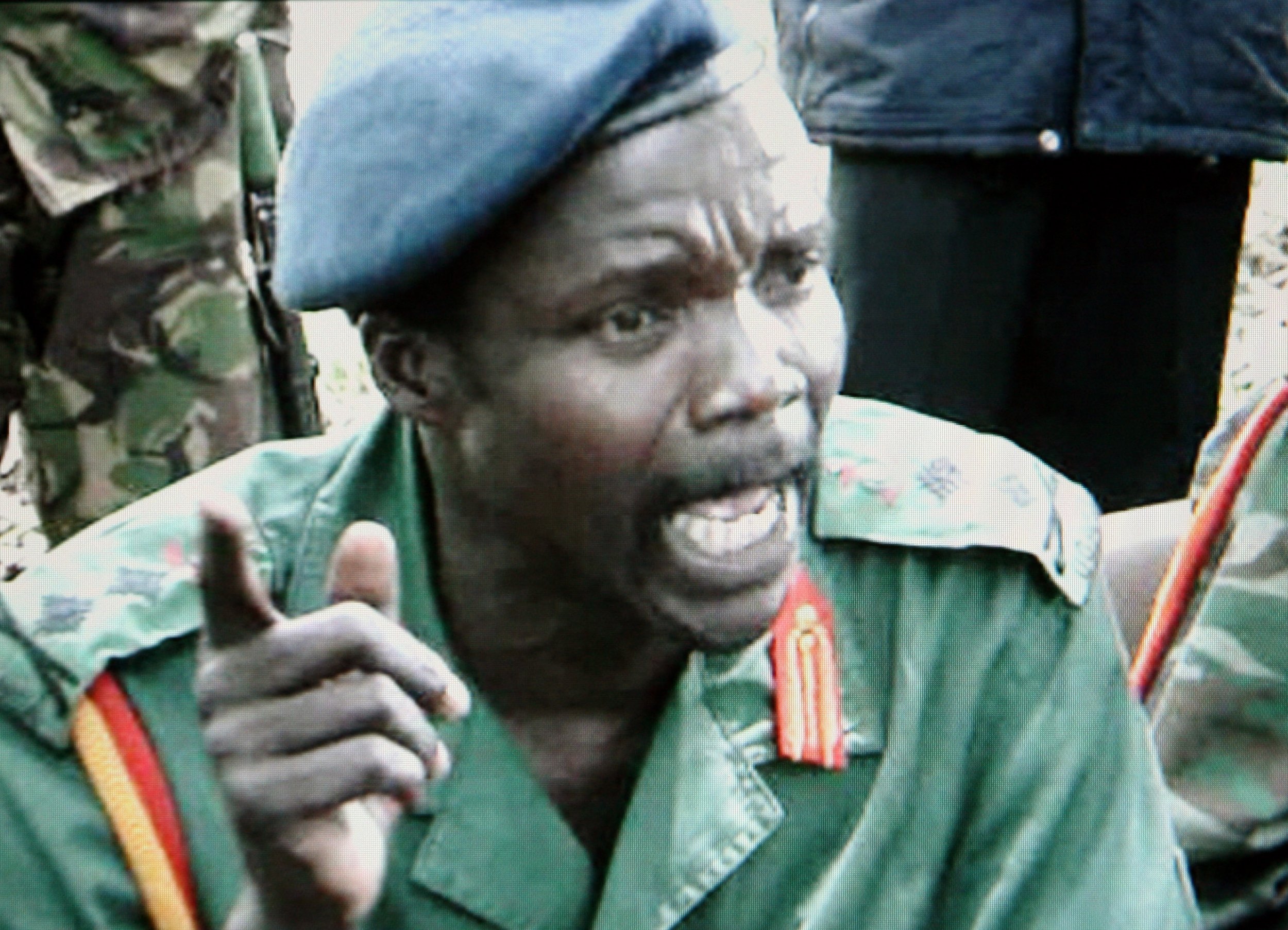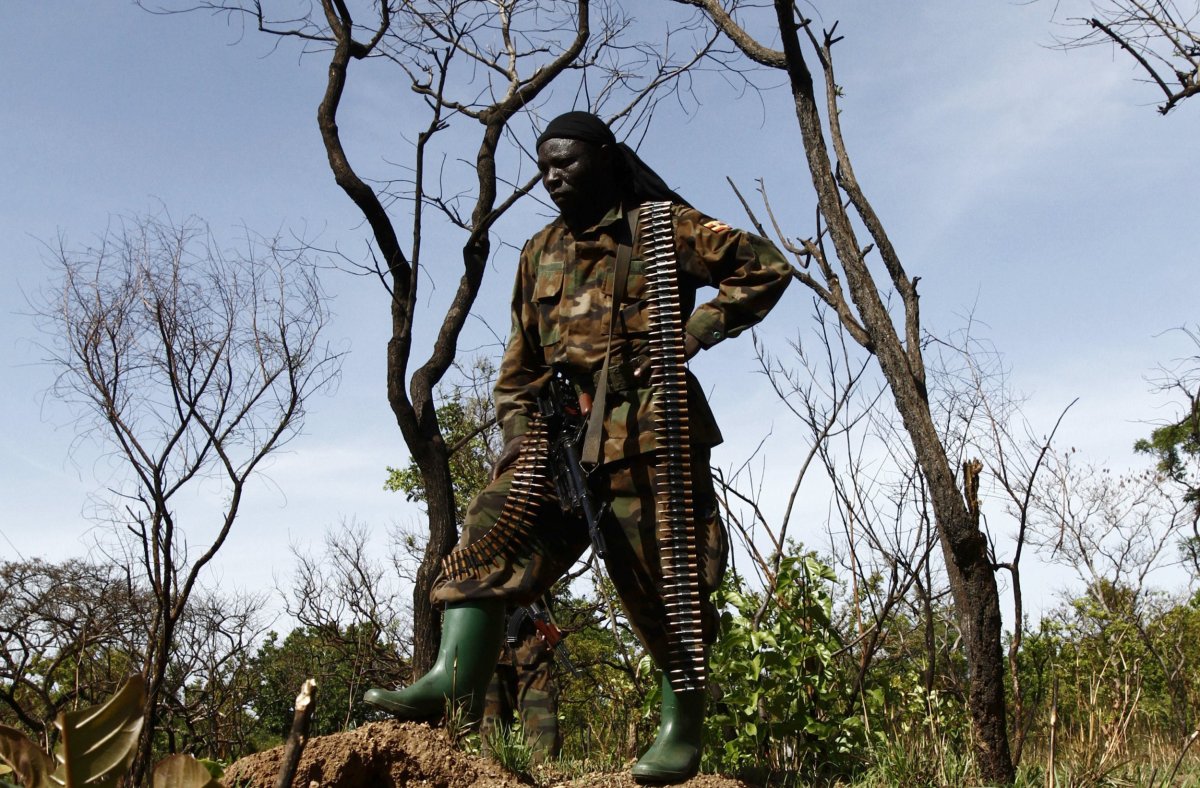
Less than five years ago, Joseph Kony's name was known across the world.
The Ugandan warlord was the subject of "Kony 2012," an informational video produced by U.S.-based nongovernmental organization Invisible Children. The purpose of the video—which was viewed 100 million times in a week, the fastest YouTube video ever at the time to reach that figure—was to promote awareness that hoped to, eventually, lead to the capture of Kony and the end of his brutal Lord's Resistance Army (LRA).
But Kony remains elusive, and some of the key players in the hunt to catch him appear to be resigned to failure. The U.S. military's Africa Command (AFRICOM) announced in late March that, after six years' searching, it was pulling American troops from Central African Republic (CAR), a fragile state where the LRA has partially relocated after having been chased from Uganda.
Now, Uganda appears to be following suit: The Ugandan force commander has announced that troops would begin withdrawing from eastern CAR in May, Senegal-based Agence de Presse Africaine reported on Sunday. The Ugandan troops are due to pull out of CAR by May 2018.
Uganda has been leading an African Union (AU) mandated mission, authorized in 2011, to hunt down the remaining LRA fighters. The militant group rose up in northern Uganda in the 1980s, claiming it wanted to impose a warped version of the Ten Commandments in the region. The group killed thousands of people and kidnapped tens of thousands of children, forcing them into combat: Invisible Children estimates that over 30,000 children were forced into the ranks of the LRA. But since Ugandan troops pushed the group out in the mid-2000s, those fighters who've remained now roam remote and often inaccessible regions in Central Africa across several fragile countries: CAR, Democratic Republic of Congo, and South Sudan.
The AU mission was set up ostensibly as a joint task force between the four countries, but conflicts in South Sudan and CAR coupled with near-perpetual instability in the vast Congo have meant that Uganda has shouldered most of the burden in chasing Kony: Ugandan troops make up around two-thirds of the 3,000-strong force. The joint task force was set up with the mission of eliminating the LRA and stabilizing the regions affected by the militant group.
Few would argue that the LRA is a shadow of the force it once was. In its statement in March, the U.S. military said that the group's "active membership" had been reduced to less than 100 fighters. Four of the five key leaders of the group, all of whom were subject to International Criminal Court (ICC) arrest warrants issued in 2005, have been killed or caught ; only Kony remains a fugitive. Yet the group has adapted to its guerrilla status and continues to carry out low-level attacks; 45 purported attacks have been reported so far in 2017, with almost 150 civilians abducted, according to the LRA Crisis Tracker.
"The military response to the LRA has been a failure from beginning to end," says Phil Clark, an expert on post-conflict situations in Africa. Clark says that the main reason that the LRA has been so depleted in recent years has been the success of an amnesty program instituted by the Ugandan government for militants who had taken up arms against the state, instituted in 2000. Almost 30,000 people have reportedly benefited from the amnesty since 2000, the majority of whom were likely ex-LRA; Clark says that a substantial number of the group's militants have given themselves up in the past five years, a period almost contiguous to the deployment of the AU joint task force.

While the Ugandans have been leading the hunt for Kony, the tempo of their missions has dropped in recent years, according to Ben Shepherd, an expert on Central Africa at Chatham House. The Ugandan military has been stretched by other deployments: more than 6,000 Ugandan soldiers are fighting Al-Shabab in Somalia, the most of any one country, and Uganda is also supporting peacekeeping efforts in South Sudan. And a military spokesman said in June 2016 that they intended to draw down the mission in CAR because of a lack of support from the international community.
"Kony has not been in the headlines for quite a long time, certainly not in the way he was with the 'Kony 2012' moment, and the brutal reality is that the LRA is no longer the threat it once was," says Shepherd.
For the United States, Kony's continued evasion must be marked down as a failure. In 2011, President Barack Obama authorized the deployment of 150 U.S. troops to Central Africa whose mission was "the removal of Joseph Kony from the battlefield." Since then, the Department of Defense has spent more than $780 million on the operation, a Pentagon spokeswoman told the New York Times in March.
"This is basically an admission on the part of Uganda and the U.S. that they are not going to be able to capture Kony," says Clark. "That's quite a remarkable development given that both governments made very big claims. It's turned out that it is much more difficult to locate a single individual in the very thick jungles of that region."
Uncommon Knowledge
Newsweek is committed to challenging conventional wisdom and finding connections in the search for common ground.
Newsweek is committed to challenging conventional wisdom and finding connections in the search for common ground.
About the writer
Conor is a staff writer for Newsweek covering Africa, with a focus on Nigeria, security and conflict.
To read how Newsweek uses AI as a newsroom tool, Click here.








